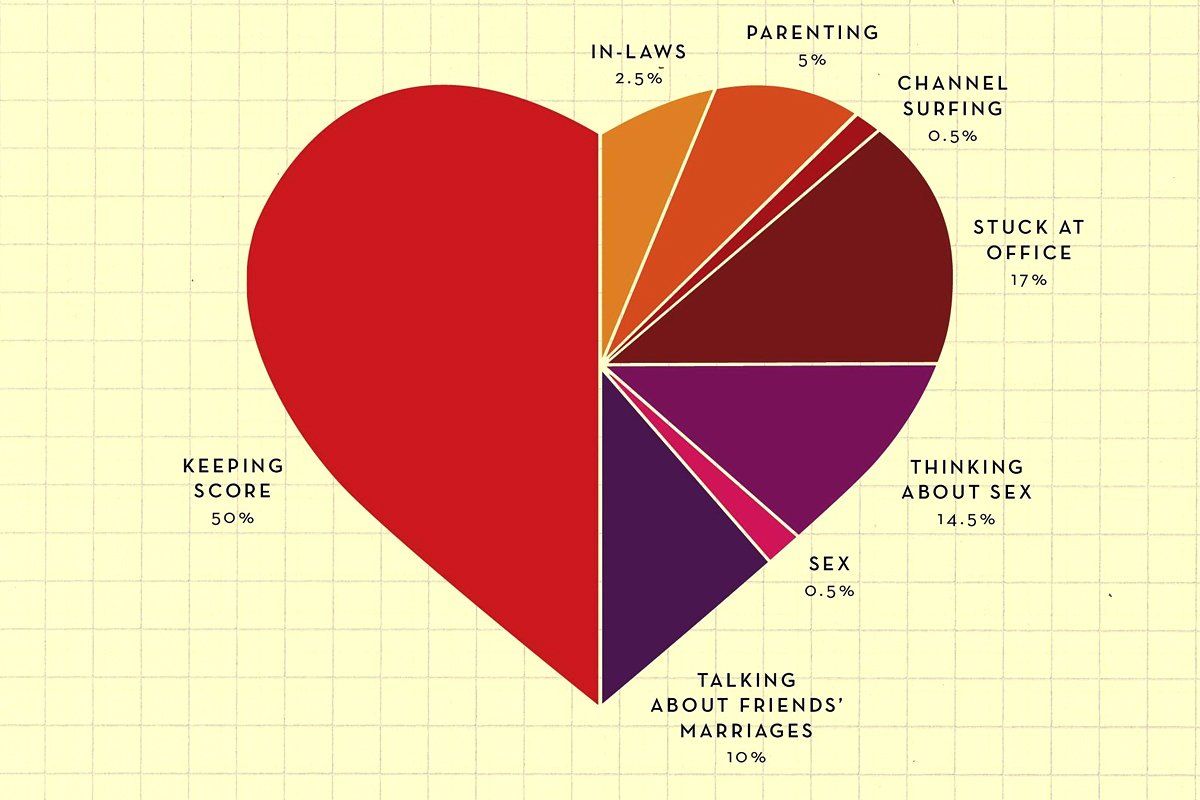
To prove a point after a nasty argument—kitchen cabinets were again left open, words were exchanged—my husband sketched a graph plotting the recent state of our marriage. His point was that we were having more bad days than good, and that something was needed to remedy this. But his chart got me thinking: maybe I was actually looking at the remedy. Maybe the solution to our marital strife wasn't to be found on the therapist's couch, but in the hard language of empirical data.
As a business-news editor, I was already mired in news about housing bubbles, market noise, and incentives—which, oddly, seemed to have parallels at home. My relationship bubble had burst not long after I said "I do." Were we insufficiently compatible—or just reacting to screwed-up incentives?
I realize this might sound nuts to some people. But I was convinced I was onto something, that the principles of economics—often fact-based and always pragmatic—could reveal the route to wedded bliss (or, in econ-speak, "utility"). So I picked up the phone and cold-called Gary Becker. This also might sound nuts. Gary Becker is one of the world's most famous living economists. He's won the Nobel Prize and the Presidential Medal of Freedom. But could he give relationship advice?
Indeed he could. He's written a ton on the economics of the family and thinks about it in his own marriage. It's why his wife does more of the housework, he said. Since his time, on a monetary scale, is more valuable than hers, he spends more of it working in his office and less in the kitchen. Lucky him.
Nearly four years later, I've had similar conversations with hundreds of economists, psychologists, and regular married folks in a journey that eventually became a book called Spousonomics: Using Economics to Master Love, Marriage, and Dirty Dishes, written with my friend and fellow business journalist Jenny Anderson. This research, combined with experimenting on my own husband, has led me to recommend a few core principles for anyone looking to fix their marriage.
One key area is incentives, the things that motivate people. Mortgage deductions spur home purchases; salaries entice people to work. My husband's incentive to close cabinets—avoid nagging—wasn't exactly "perverse," but it was backfiring. Turns out, there are better incentives. One is trust, which economists have found can be surprisingly motivating. In one example, people were more likely to donate blood if they weren't paid than if they were. Who knew?
So I tried having a little faith in my guy. I stopped nagging. And one day I came home to find CLOSE ME signs taped inside our cabinets as reminders to himself.
Another lesson: 50/50 isn't the best way to divide housework. We want an egalitarian marriage (and anything else would betray the feminist principles my mother taught me). But Adam Smith famously noted that efficiency is maximized when workers specialize. Today, I gladly pay all the bills, and my husband—mostly gladly—does all the sweeping and mopping.
The concept that's had the most profound impact is loss aversion. Behavioral economists have shown that we hate to lose twice as much as we love to win, and when we sense we're losing, we get irrational. Loss aversion has been partly blamed for Lehman Brothers' failure to admit its losses early enough to save the company.
I'm vehemently averse to losing. But now I try to be aware of when I cross into loss-aversion mode during disagreements. Then I call a time-out. Sometimes that means going against the advice everyone gave me before I got married: never go to bed angry.
For what it's worth, going to bed angry is a miracle cure. I stop escalating, get some sleep, and wake up with a clearer head. Nine times out of 10, the dispute gets resolved that morning. It's called maximizing utility—or, in my house, living happily ever after.
Szuchman is the coauthor of Spousonomics: Using Economics to Master Love, Marriage, and Dirty Dishes.
Uncommon Knowledge
Newsweek is committed to challenging conventional wisdom and finding connections in the search for common ground.
Newsweek is committed to challenging conventional wisdom and finding connections in the search for common ground.
About the writer
To read how Newsweek uses AI as a newsroom tool, Click here.








